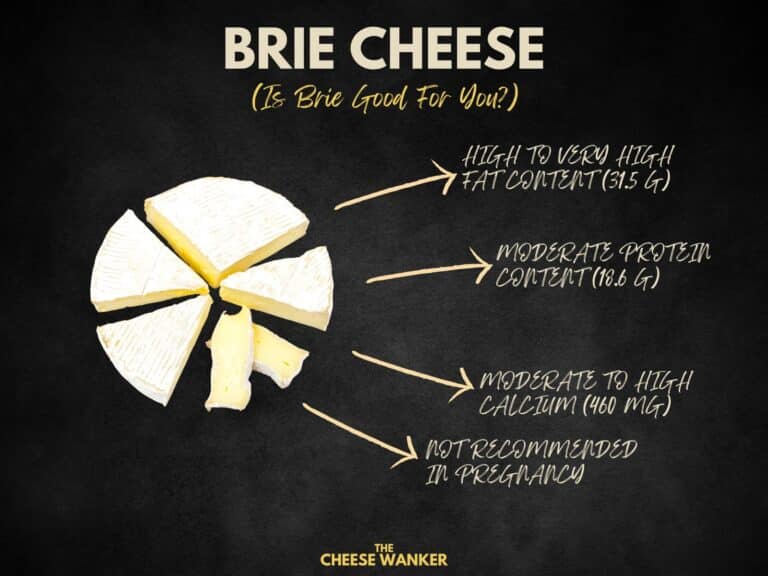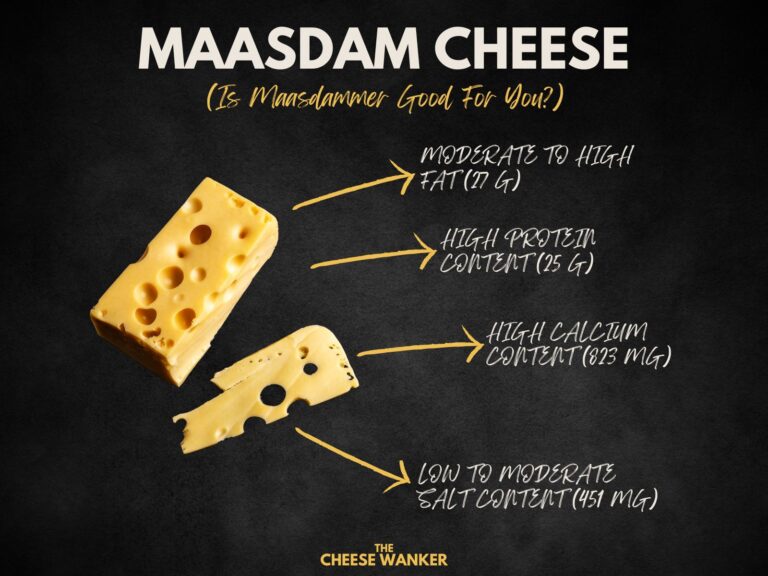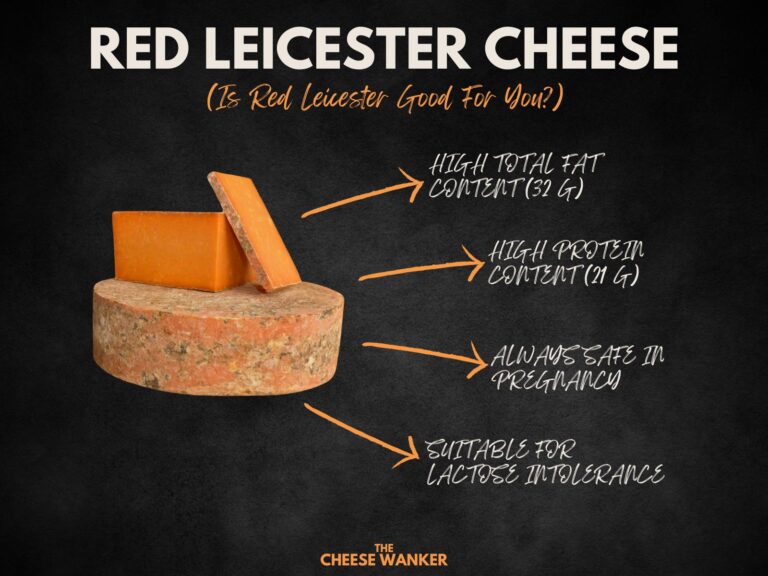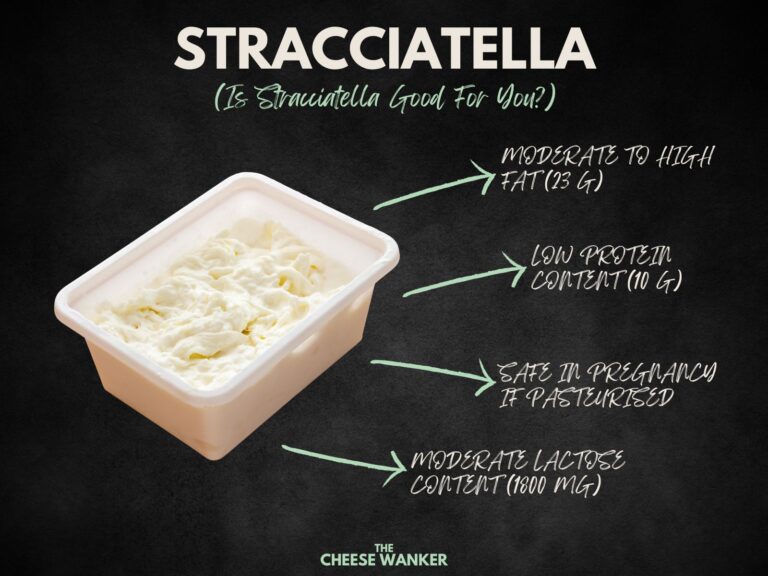Without a doubt, Monterey Jack is a classic American cheese. Its production can be traced back to Franciscan monks under Spanish rule in the 19th century. Read on to learn about the nutrition facts of Monterey Jack.
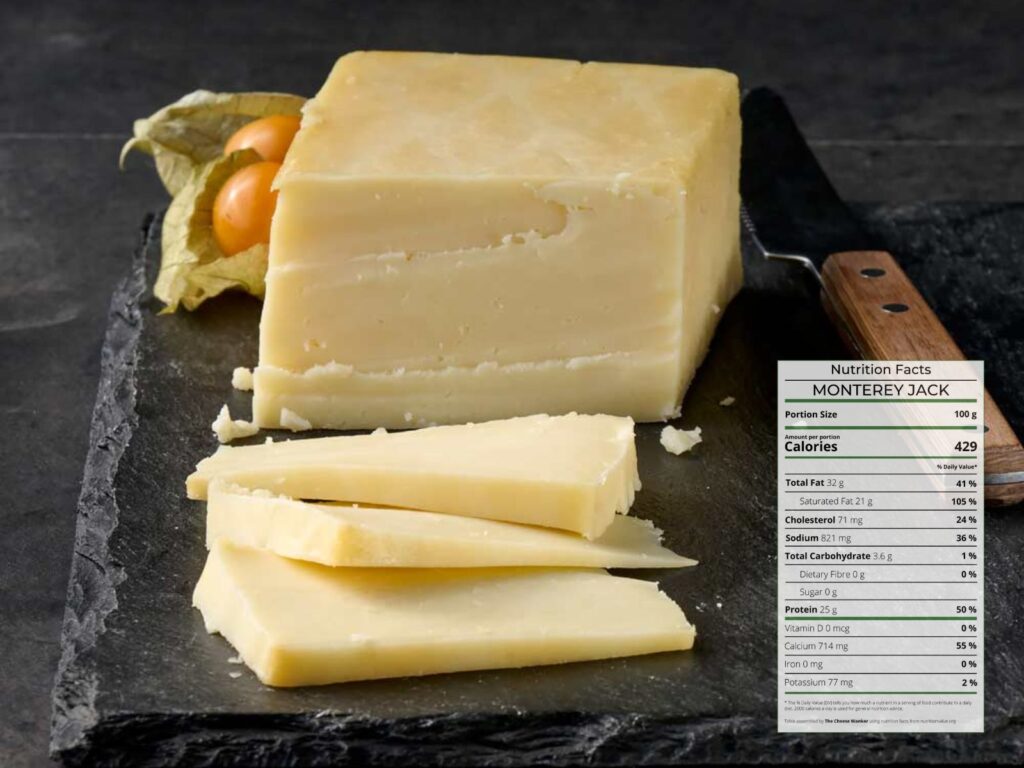
SEE ALSO: Nutrition facts for popular world cheeses in The Cheese Wanker’s index →
What is Monterey Jack cheese?
Monterey Jack cheese originates from California and is made from cow’s milk. It boasts a semi-hard, pale yellow interior with a smooth texture. This cheese owes its name to David Jacks, who first produced it in the 19th century in Monterey, California.
Monterey Jack has a mild, buttery flavour that makes it a versatile addition to various dishes and snacks.
Nutrition fact sheet
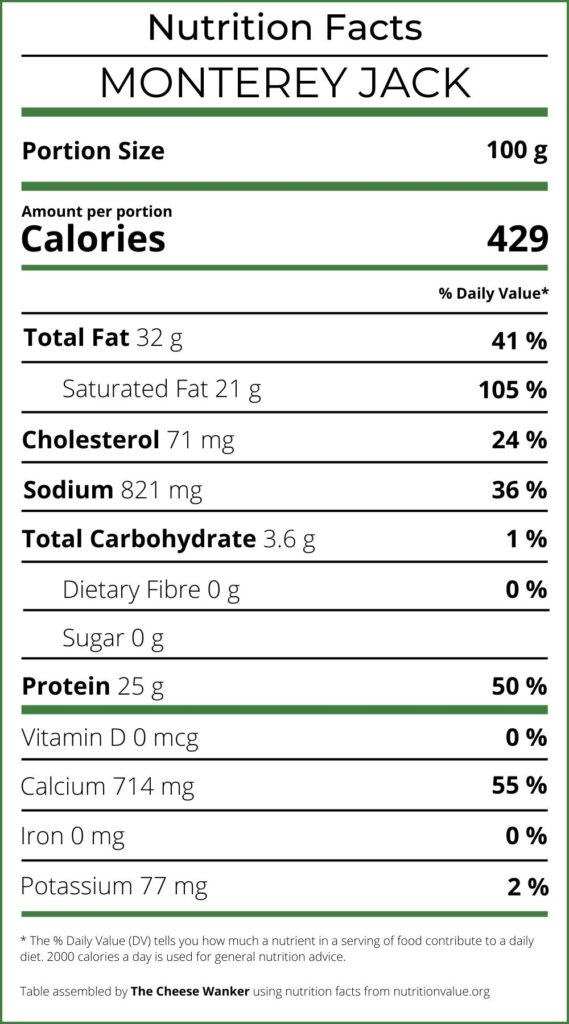
Country of origin
United States of America
Type of Cheese
Milk
Cow (Pasteurised)
Examples
Original Monterey Jack, Dry Jack, Pepper Jack, Colby-Jack, Cheddar Jack
Safe
Keto Diet, Lactose Intolerance, Pregnancy*
Avoid
Milk Protein Intolerance, Low Sodium Diet
Nutritional review for Monterey Jack
Without a doubt, Monterey Jack is a very popular around the world. In our assessment, we have crafted a nutritional profile using the original unaged version of this cheese product.
You can find our nutritional assessment for the flavoured Pepper Jack cheese here.
Here are some of its key nutrition facts:
Lactose Intolerance
For individuals with lactose intolerance, Monterey Jack cheese offers a potential solution. As an aged cheese, it undergoes a fermentation process, resulting in reduced lactose content.
Transitioning to Monterey Jack can alleviate discomfort for those who struggle to digest lactose, allowing them to enjoy the pleasure of cheese without the associated digestive issues.
Fat Content
Monterey Jack cheese is a moderate source of fat, making it suitable for inclusion in a balanced diet. In a 100-gram serving, it typically contains around 32 grams of fat. While it is important to consume fats in moderation, the active individual can benefit from the energy and essential fatty acids present in Monterey Jack.
Moreover, because its carbohydrate content is relatively low, this product may also be suitable for people following a ketogenic diet.
You can learn more about the keto diet and which cheeses are most keto-friendly by clicking here.
Cholesterol Content
When considering cholesterol, Monterey Jack cheese presents a moderate option. Active voice is used here. In a 100-gram serving, it typically contains approximately 71 milligrams of cholesterol.
Although the overall cholesterol content is relatively low compared to other cheeses, individuals with specific dietary concerns should factor this into their daily intake.
Protein Content
Furthermore, Monterey Jack cheese provides a notable source of protein, essential for various bodily functions. In a 100-gram serving, it offers around 25 grams of protein.
Protein is crucial for tissue repair and growth, making Monterey Jack cheese an appealing option for individuals seeking to meet their protein requirements.
Want to find out which cheeses have the highest protein content? Click here for our blog post covering cheeses with the highest protein content.
*Safety in Pregnancy
During pregnancy, maintaining a nutritious diet is paramount. Monterey Jack cheese is generally safe for consumption during pregnancy, given that it is made from pasteurised milk.
However, it is essential to remember that a balanced diet consisting of a variety of nutrient-rich foods is of paramount importance. Consultation with a healthcare professional can provide tailored guidance based on individual needs.
You can read more about which cheeses you can eat when you’re pregnant by clicking here.
Salt Content
Additionally, it is essential to consider the sodium levels in Monterey Jack cheese. In a 100-gram serving, it typically contains around 820 milligrams of sodium. Monitoring sodium intake is crucial for individuals with hypertension or those aiming to reduce their overall salt consumption.
Opting for low-sodium varieties or consuming Monterey Jack cheese in moderation can help maintain a balanced diet.
Calcium Content
Finally, Monterey Jack cheese serves as a noteworthy source of calcium, contributing to bone health and other physiological functions. In a 100-gram serving, it provides approximately 714 milligrams of calcium.
This makes it a valuable addition to the diet, particularly for individuals with lactose intolerance or those who seek alternative sources of calcium.
Conclusion
In conclusion, Monterey Jack cheese offers a delectable and nutritionally diverse addition to various meals and snacks. Its relatively low lactose content makes it a favourable choice for individuals with lactose intolerance.
While it contains a moderate amount of fat and cholesterol, it also provides essential protein and calcium.
During pregnancy, Monterey Jack cheese can be safely consumed in moderation, ensuring necessary nutrient intake. However, it is vital to monitor sodium levels, especially for those with specific dietary concerns.
Incorporating Monterey Jack cheese into a well-rounded diet allows for a flavourful and nutritionally balanced culinary experience.
References
All the advice relating to what cheeses you can eat during pregnancy in this article is based on the recommendations by health authorities in Australia, the UK and the USA. If you are unsure about what you can or cannot eat, please consult your doctor.
Australia – FSANZ
United Kingdom – NHS
United Sates of America – FDA
